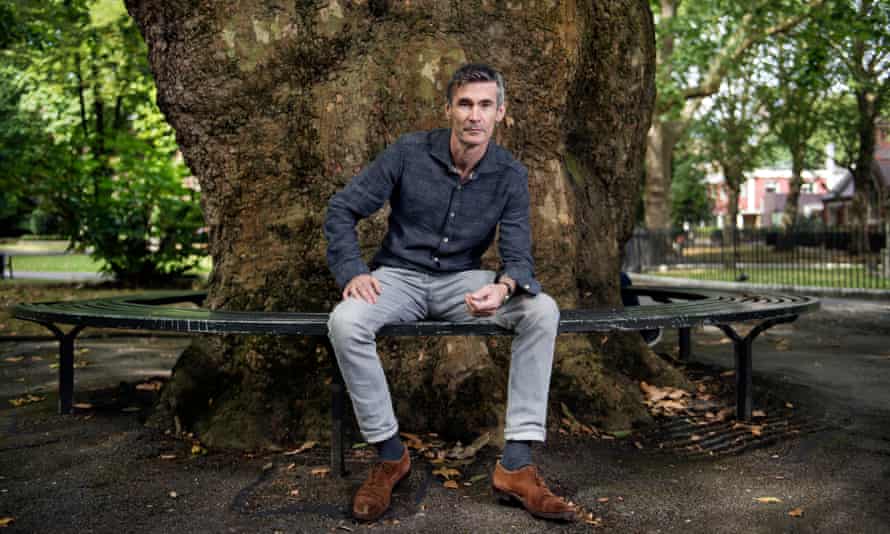Now We Shall Be Entirely Free by Andrew Miller Reviews
A ndrew Miller has some nerve. Nerve in the sense of both courage and cheek, for daring to write historical fiction that refuses to take anything to do with the stylistic experiments of the last hundred years, nor (à la Hilary Mantel) with the pursuit of deep psychological insights and cross-century parallels. Like several of his previous books – including his multi-awardwinning offset novel Ingenious Pain (1997) and the Costa prize-winning Pure (2011) – Now We Shall Exist Entirely Free is set in the early Romantic flow, and like those precursors it plays no formal tricks and has no obvious ludic or cultural self-consciousness. The resemblances it bears to other novels – in particular Robert Louis Stevenson'southward Kidnapped and The Master of Ballantrae – feel more like shadows falling across the text than knowing references. It is a 4-square adventure story, with an intrepid male hero, a supporting cast of women who are either meekly servile or scrabbling rather prettily at the bars of convention, landscapes that are rugged but essentially benevolent, and a villain who – although allowed some reason for existence so – is a real bounder. Miller sets himself a difficulty like to others he has created for himself in the past. Merely as the hero of his get-go novel is mostly incapable of feeling pain, and the heroine of 2015'south The Crossing is inscrutable in the aftermath of tragedy, and so his electric current protagonist, John Lacroix, is closed off from those effectually him. In other words, the new novel again combines a forrard-diving narrative with the description of a land of bafflement. Miller's principal ways of performance and his principal graphic symbol pull in dissimilar directions.
The story begins in 1809, when Lacroix returns dwelling to Somerset after eight months fighting with the British army in Spain. Exhausted and injure, he is nursed back to something like his former self by his trusty housekeeper, Nell, but remains "absent-minded" in mind. Clearly something bad has happened. Exactly what, and how bad, nosotros are left to imagine, while a fellow officer arrives to remind him that he is still a soldier and should report for duty when recovered. Lacroix makes plans to bolt to the islands of Scotland, where nosotros suppose he volition find a salve for his torment, or merely somewhere to hide.
Because of the events in Kingdom of spain, the British loftier command commissions a soldierly thug called Calley to set off for England and put paid to Lacroix – then begins a story of flight and pursuit. The journey north gives Miller a take chances to add some authenticating historical detail, most of which he does well, in a dry simply observant mode. We hear near Calley'southward brutally determinative feel as a child; nosotros see the spoiling furnishings of industrialisation on the countryside he passes through; and we gather some evidence of the main religious and political movements of the fourth dimension.

Although Lacroix keeps mum while travelling, nosotros have seen enough of his mind by this phase to know that he feels himself to exist "at the edge of something" (breakdown, paranoia, confession), and understand that the entreatment of a remote island has something to do with finding a physical place that matches his interior mood. When he somewhen arrives, he is non as alone as he imagined he would exist. Already ensconced on the isle is a small family of idealists, living their utopian dream in much the aforementioned fashion that Coleridge and others planned to practice on the banks of the Susquehanna River.
As Calley closes in, we are reminded again of both the strengths of Miller'due south procedures, and their limitations. The pacing of his story is excellent; his style is crisp; his apprehension of pain is arresting; and his ability to show people trembling at the edge of un-reason is compelling. "Even the well-nigh sensible people accept an edge of lunacy to them," he writes at one point, "similar fatty on a cutlet." But as the story reaches its climax, the tension between action and withholding becomes increasingly problematic. It'southward not but that Lacroix is reticent, and that so much action happens off stage or invisibly. Information technology's too that when Lacroix does finally confess the full story of what happened in Spain, he reveals a paralysis in himself that we are never entirely convinced has been cured. Is this plausible psychology? Possibly. Does it testify a disharmonize in Miller himself, between his ambition for writing a historical yarn and something quieter, more subtle and more inward? This seems just as likely.
Source: https://www.theguardian.com/books/2018/aug/31/now-we-shall-be-entirely-free-andrew-miller-review
0 Response to "Now We Shall Be Entirely Free by Andrew Miller Reviews"
Post a Comment